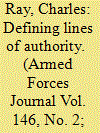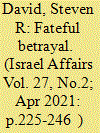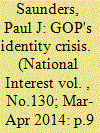| Srl | Item |
| 1 |
ID:
086816


|
|
|
|
|
| Publication |
2009.
|
| Summary/Abstract |
Since the administration of President Dwight Eisenhower, newly appointed American ambassadors have been given a presidential letter outlining their authority over U.S. government programs and personnel in the country to which they are accredited. The letter describes the ambassador or chief of mission (COM)as the personal representative of the president, with full authority for the direction, coordination and supervision of all U.S. government executive-branch employees, except those under a combatant commander (COCOM).
|
|
|
|
|
|
|
|
|
|
|
|
|
|
|
|
| 2 |
ID:
177741


|
|
|
|
|
| Summary/Abstract |
In order to pressure Israel to withdraw from the lands it took following the 1956 Suez War, the United States made two key commitments. It promised Israel it would open the Straits of Tiran if Egypt reimposed a blockade and that if the blockade nevertheless persisted, Israel would have the right to act on its own to ensure free passage of Israeli ships. When Nasser closed the Straits in 1967, President Johnson reneged on both commitments. LBJ chose not to act to end the blockade and warned Israel not to act alone. The failure to live up to these commitments contributed to the outbreak of the 1967 War, hampered efforts to get Israel to give up the territories it conquered as a result of the war, and reinforced in Israel the conviction that it could not depend on others for its security. Israel and the Middle East would be very different places today if those commitments had been fulfilled.
|
|
|
|
|
|
|
|
|
|
|
|
|
|
|
|
| 3 |
ID:
128002


|
|
|
|
|
| Publication |
2014.
|
| Summary/Abstract |
IN 1958, after the Republican Party suffered a stinging defeat in the midterm elections that compounded the 1954 loss of its briefly held control of Congress, Whittaker Chambers sent a letter to William F. Buckley Jr. Buckley, who had founded National Review three years earlier, was trying to create a conservative insurgency. Like many other conservatives, including Ronald Reagan, he revered Chambers for his searing break with Communism and his exposure of Alger Hiss as a Soviet agent, which he chronicled in his memoir Witness. Chambers had warned the youthful Buckley against consorting with the radical Right, arguing that politicians such as Senator Joseph McCarthy discredited rather than bolstered a fledgling conservative movement.
|
|
|
|
|
|
|
|
|
|
|
|
|
|
|
|
| 4 |
ID:
184984


|
|
|
|
|
| Summary/Abstract |
During the 2016 US presidential campaign, candidate Donald Trump suggested the United States could benefit from a more unpredictable foreign policy. The assassination of Iranian Major-General Qasem Soleimani by US forces in 2020 during the Trump administration may be the best recent example of this doctrine in action. Other American presidents, including John F. Kennedy, Richard Nixon and Bill Clinton, have applied it in different ways. Historical comparisons of its use in the Cuban Missile Crisis and the conflicts in Vietnam and Kosovo suggest that the expected liabilities of the strategy outweigh any likely gains. Russian President Vladimir Putin appears to be seeking to establish strategic unpredictability by threatening NATO with nuclear escalation should it interfere heavily in Russia’s war in Ukraine. This threat, however, has not deterred NATO from providing effective assistance to Ukraine. Policymakers should be deeply sceptical about the benefits of strategic unpredictability.
|
|
|
|
|
|
|
|
|
|
|
|
|
|
|
|
| 5 |
ID:
178192


|
|
|
|
|
| Summary/Abstract |
Drawing on newspaper and archival sources, this article examines post-war Canadian attitudes towards Dwight D. Eisenhower, particularly during his time in office as the United States President from 1953 to 1961. Eisenhower emerged from the Second World War as a trusted figure for many Canadians due to his inspiring leadership of the Allied cause. Once in the White House, however, his reputation began to suffer, and public opinion in Canada increasingly questioned core elements of the traditional Canada–United States relationship and America's ability to lead the Western alliance during a period of heightening Cold War tensions.
|
|
|
|
|
|
|
|
|
|
|
|
|
|
|
|